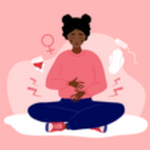Let’s talk about our periods
Menstruation is a perfectly normal sign of a healthy body. Why do we still find it so hard to talk openly about it? As part of the CMI/UiB research project ‘Pushing pads, Selina Rombach is looking for answers.
-Why is it that we can talk about menstruation on a technical level, but start giggling as soon as it gets personal? There seems to be a vast difference between the understanding of menstruation as a biological phenomenon and the personal experience of having your period, says Selina Rombach, Master's student at CMI and UiB.
Rombach has always been fascinated by this massive gap between the biological realities and the lived experience and wanted to explore the topic further in her Master’s thesis. She is part of the team behind the research project ‘Pushing pads’, a CMI/HEMIL (UiB) joint effort, and recently came back after doing fieldwork in Tanzania.
Does gender equality equal less stigma?
Her aim was to find out whether there is a link between the stigma connected to menstruation and the attitudes towards gender equality.
-The majority of research, and especially the campaigns that are run by different NGOs, are focused on the WASH (Water Sanitation Hygiene) perspective. It is a common preconception that girls in many parts of the world are forced to stay at home from school when they menstruate because they don’t have access to for example clean water and toilets during their school day. That can be true but it is not just solved by building toilets. Access to everything a menstruator needs, including pain medication, and an environment where stains or other revealing signs of the period are not an end-of-the-world scenario, is what is needed. One other factor that could matter is the stigma connected to periods in patriarchal societies. There are not so many studies that systematically look on gender equality as a determinant of attitudes towards menstruation, she says.
Yet, there is this perception among many that there are structural, cultural reasons behind this need to hide anything connected to having your period; that the shame about menstruation is a symptom of a not yet achieved gender equality or in other words a symptom of patriarchal ideas about the role of women and girls in our society.
That is why the preliminary findings from the survey she conducted among Tanzanian female and male students between the ages of 13-19 have surprised her. When the students were asked questions about gender equality, menstruation and ‘menstruation appropriate’ behaviour, the results showed only a small relationship among their attitudes about these constructs. There was not a strong link between students replying that there should be gender equality and that they should be able to talk openly about menstruation.
-It may be that my questions for the students did not fully capture the whole picture or were just not relevant for their realities, but a recent study that showed a strong link between idea about sexism and openness to talk about menstruation points to the need for more comprehensive research on menstruation stigma. You can have good access to menstruation products and sanitation, and still experience an environment that is hostile to openness, says Rombach.
A universal experience
What is clear is that knowledge matters. The more knowledge people have about menstruation, the less shame and stigma. And Rombach feels that more knowledge is needed, also about the connection between gender equality and attitudes towards menstruation.
She would like to go back to do in-depth interviews with the students, hoping to capture more of their sentiments around menstruation. Talking to research partners about menstruation and being a guest at education sessions in classrooms, she found that also the young students were very good at explaining what goes on in our bodies when we menstruate. But as soon as it gets personal, everyone starts giggling.
-Maybe the feeling of embarrassment that having your period provokes is more universal than we think. I can relate to it myself. I have no problem at all talking about menstruation as a social and political issue. I do it all day. But when I have my period, I find myself checking my trousers for stains, she says.
A survey from Care Norge suggests that she is not alone. It found that more than half of Norwegian women feel shame and discomfort connected to menstruating. Clearly, we still have a long way to go before we can talk openly about our periods.
Project
